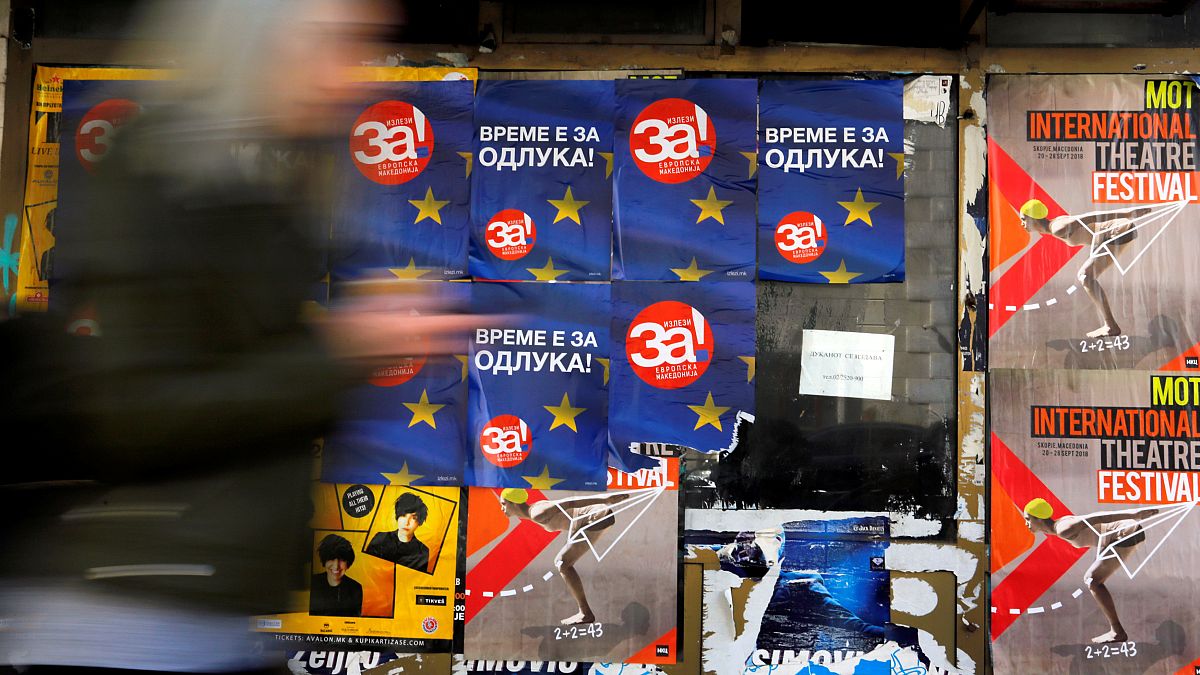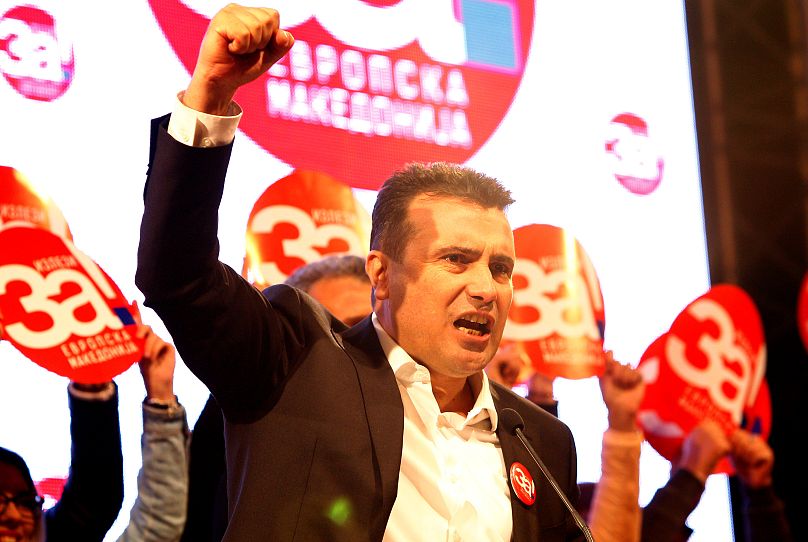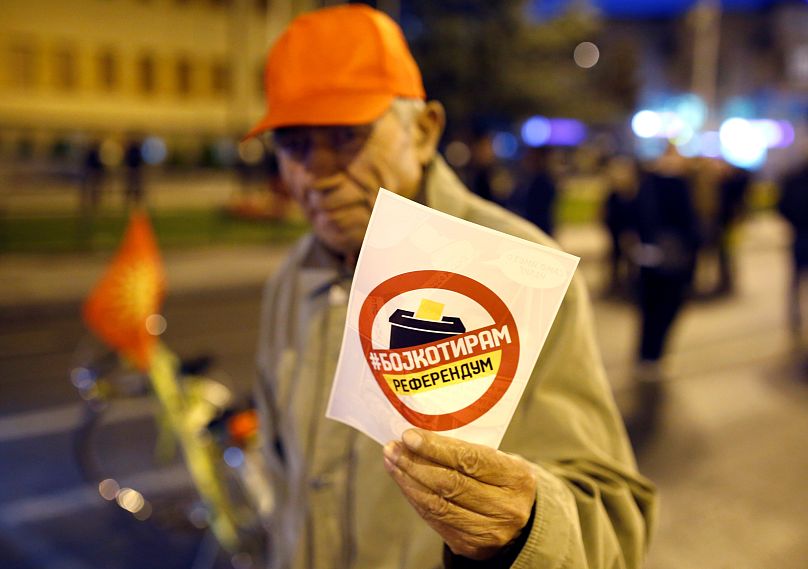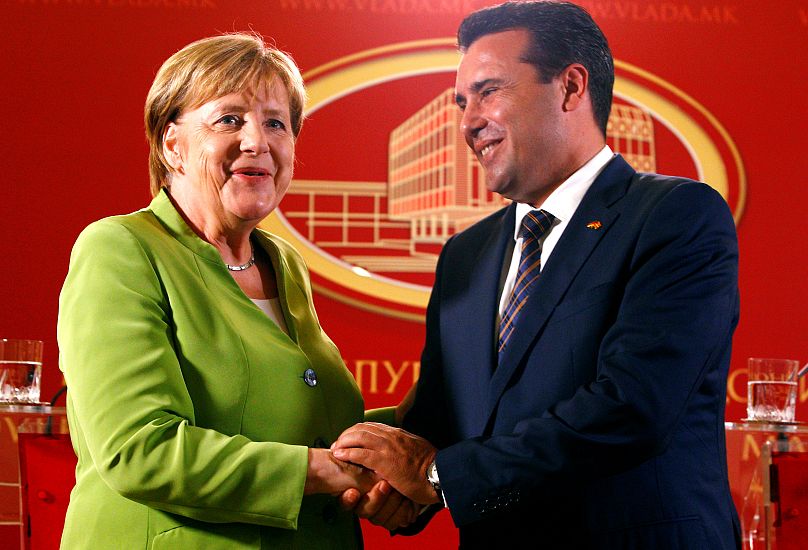A referendum on changing the nation of Macedonia’s name to North Macedonia to pave the way for NATO membership attracted tepid voter participation Sunday, a blow to the prime minister’s hopes for a strong message of support.
With a fifth of the results processed, voter turnout in the Former Yugoslav Republic of Macedonia (FYROM) referendum is currently at 33%, well short of the minimum constitutional requirement of 50% to validate the vote.
However, strong support for the name change is being reported amoung voters who did show up to the polls, with 90% voting "Yes" while only 6% voted "No" so far, based on data from 85% of polling stations.
After a quiet campaign and low turnout of the citizens to the referendum, Prime Minister Zaev made clear that he will remain in his position and will move forward with the ratification process in the Parliament, something that will definitely cause political developments.
Nearly two million voters were expected to go to the polls in Macedonia (FYROM) today in a referendum to change the country's name and put an end to a decades-long conflict with neighbour, Greece.
Low voter turnout would likely strike a blow to Prime Minister Zoran Zaev's pro-western government's hopes for widespread support for the name change.
The deal’s opponents, including President Gjorge Ivanov, had urged voters to boycott the referendum, saying that it was not a good deal for Macedonia.
Athens has long argued that by using the name "Macedonia", Skopje is laying claim to a northern Greek province of the same name and had therefore blocked its smaller neighbour's accession to NATO and the EU.
A "Yes" vote in the referendum could soon see the Western Balkan country join the two blocs.
What is the referendum question?
The text of the question put to voters will be: "Are you in favour of European Union and NATO membership by accepting the agreement between the Republic of Macedonia and the Republic of Greece?"
For the referendum to be valid, turnout needs to reach at least 50%.
But as it's non-binding and requires constitutional change, should the "Yes" vote win, two-thirds of parliament will still need to approve it. Lawmakers in Greece will also need to approve it.
What are the implications?
A "Yes" vote will pave the way for the freshly-renamed country to join the EU and NATO.
In June, the EU agreed to set "out the path towards opening accession negotiations in June 2019" — a giant leap forward for the country, which first asked to join the bloc in 2004.
However, several countries — including France, the Netherlands and Denmark — opposed the move, demanding the country makes further reforms in areas including the fight against corruption and improvements to the judicial system.
NATO leaders also decided in July to invite FYROM to begin accession talks to join the alliance.
Accession talks were blocked by Greece in 2008 because of the name dispute. Should it be successful, it would mean that most Balkan countries — except Serbia and Bosnia and Herzegovina — are either already NATO members or on the way to become one, further chipping away at Russia's influence in the region.
Who says what?
Within FYROM:
Prime Minister Zoran Zaev backs the name change and has been leading the "Yes" campaign.
"NATO membership would bring stability and security, which is important for investment," he said at a recent rally.
However, the country's president, Gjorge Ivanov, from the main opposition party VMRO-DPMNE, has been leading the boycott campaign.
During his speech at the UN General Assembly earlier this week, Ivanov urged his compatriots not to go to the polling stations, arguing the settlement with Greece is a "historic suicide" and a "flagrant violation of sovereignty."
The West:
The US, EU and NATO have all backed the name change with several high profile visits to the country to encourage the "Yes" vote.
US Vice President Mike Pence, who met Zaev last week in Skopje, "expressed his strong support" for FYROM's agreement with Greece and "for the country as it moves forward to membership in NATO and the EU," a statement said.
German Chancellor Angela Merkel also travelled to FYROM earlier this month to lend her support to the "Yes" campaign while French President Emmanuel Macron issued a video message on the Facebook page of the French embassy in Skopje encouraging people to vote and back the deal.
"I strongly support it and firmly believe this agreement is good for you, for the region and for Europe," he said.
Some Greeks have also violently opposed the agreement, clashing with police at demonstrations earlier this month in Thessaloniki with one demonstrator saying "there is one Macedonia and it's Greek, and that's non-negotiable."
Russia:
"There is clearly a concerted effort to thwart the democratic rights of Macedonians and delegitimise the referendum vote," the Transatlantic Commission on Election Integrity said in a statement on Wednesday.
It said it had uncovered evidence that automated Twitter accounts are working to suppress voter turnout and that it knew of "covert financial campaign from individuals in Greece and Macedonia to support anti-referendum groups."
Although the Commission did not explicitly say Russia was behind the effort to suppress turnout, US and EU officials have.
"No doubt that they (Russians) have transferred money and they are also conducting broader influence campaigns," US Defence Secretary Jim Mattis said during a visit to Skopje last week.
In an unprecedented move, Athens also expelled two Russian diplomats and barred two more from entering the country for alleged meddling.
Russia strongly denies the accusations but its ambassador to Skopje has come out against the agreement to change Macedonia's name and future accession to NATO. He warned that the country could become a "legitimate target" if relations between the alliance and Russia deteriorate.





